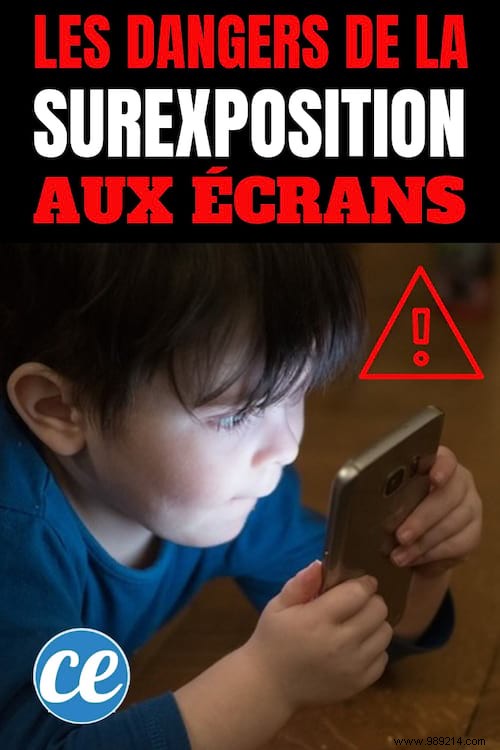
Overexposure to screens is a real scourge!
Young children, and even babies, are being exposed earlier and earlier...
...but also for longer and longer on screens.
Faced with this observation, health and childhood professionals are sounding the alarm.
Why this cry of alarm? Because they observe more and more often serious behavioral and attention disorders in toddlers.
Blame it on smartphones, tablets, computers, game consoles and TV... Explanations:

It is now not uncommon for these doctors to see 3-year-old children for consultation.
In these children who spend too much time in front of screens, doctors are increasingly finding worrying disorders.
With these children, it is impossible to attract their attention!
They don't talk, don't care about others, and don't communicate with others in any way.
They are either very agitated or, on the contrary, completely extinguished.
These alarming behaviors have prompted doctors to wonder about the reasons for these disorders.

According to them, the omnipresence of screens prevents parents and children from looking each other in the eye.
They are constantly interrupted by the screens and their attention is captured by the screens, even involuntarily.
Result, they find it difficult to interact and therefore to establish a connection with them.
Screens also interfere with the learning of children and babies. And they hinder their interactions with objects.
The problem is that this interference interferes with the normal development of children's brains.
And although these children are not subject to a neurological impairment, they have significant language and developmental delays.
For experts, the cause of this delay is obvious:children spend too much time in front of screens instead of doing traditional discovery activities.

Even more serious disorders are observed in children overexposed to screens...
Disorders that are reminiscent of autism spectrum disorders (ASD) , such as no language at age 4, significant attention deficit disorder and relationship problems.
Thus, these children do not react when we speak to them. They are not able to maintain their gaze on an adult or on an object... unless the object in question is a cell phone!
They do not know how to communicate with others. To interact, they just lick, hit or sniff.
They can't stand the frustration either, especially when you deprive them of "their" screen. And there, it is the crisis!
After investigation, the common point of these children is the central presence of screens in the family.
All day long, these children are exposed, directly or indirectly, to a screen.
Either a screen is on in the room where the child is, or the parent is in front of a screen and not paying attention to the child.

If these young children present symptoms close to ASD, it is because since their birth, they lack continuous exchanges with people.
If a close parent-baby relationship is not established through sight, voice and gestures, children cannot develop normally.
As a result, they find it difficult to communicate and interact with adults and children.
Fortunately, when doctors ask parents to remove or limit screens for children, rapid progress is seen .
The children start to exchange glances with their parents again, their attention is more sustained, they exchange smiles again, they want to play, they are more curious, and their language development resumes.

For doctors, these findings prove one thing:overexposure to screens is a cause of serious developmental delay.
But the good news is that we can act on this cause effectively by avoiding exposing children to screens.
The field experience of health professionals shows that all children are affected by this danger, regardless of their social background or cultural origin.
These phenomena have also been observed in foreign countries.
In Germany, for example, prevention campaigns are carried out in nurseries to encourage parents to watch their babies more instead of leaning over their cell phones.
In Taiwan, a fine of 1,400 euros is given to parents who leave their child under 2 in front of a screen!

To prevent serious developmental delays in babies and very young children, a prevention campaign has started in France.
The aim is to inform parents of the risks of exposing their children to screens.
The rule for parents is simple and easy to follow:
- No TV for 3 years.
- No game console before age 6.
- Internet after 9 years.
- Social networks after 12 years.